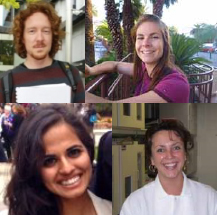Featured Paper of the Month – August 2016
Marchant, Nathan J; Campbell, Erin J; Whitaker, Leslie R; Harvey, Brandon K; Kaganovsky, Konstantin; Adhikary, Sweta; Hope, Bruce T; Heins, Robert C; Prisinzano, Thomas E; Vardy, Eyal; Bonci, Antonello; Bossert, Jennifer M; Shaham, Yavin
Role of Ventral Subiculum in Context-Induced Relapse to Alcohol Seeking after Punishment-Imposed Abstinence. Journal Article
In: J Neurosci, vol. 36, no. 11, pp. 3281–3294, 2016, ISSN: 1529-2401 (Electronic); 0270-6474 (Linking).
@article{Marchant2016,
title = {Role of Ventral Subiculum in Context-Induced Relapse to Alcohol Seeking after Punishment-Imposed Abstinence.},
author = {Nathan J Marchant and Erin J Campbell and Leslie R Whitaker and Brandon K Harvey and Konstantin Kaganovsky and Sweta Adhikary and Bruce T Hope and Robert C Heins and Thomas E Prisinzano and Eyal Vardy and Antonello Bonci and Jennifer M Bossert and Yavin Shaham},
url = {https://www.ncbi.nlm.nih.gov/pubmed/26985037},
doi = {10.1523/JNEUROSCI.4299-15.2016},
issn = {1529-2401 (Electronic); 0270-6474 (Linking)},
year = {2016},
date = {2016-03-16},
urldate = {2016-03-16},
journal = {J Neurosci},
volume = {36},
number = {11},
pages = {3281--3294},
address = {Behavioral Neuroscience Branch, Florey Institute of Neuroscience and Mental Health, University of Melbourne, Melbourne, 2337 Australia, nathan.marchant@nih.gov yavin.shaham@nih.gov.},
abstract = {UNLABELLED: In many human alcoholics, abstinence is self-imposed because of the negative consequences of excessive alcohol use, and relapse is often triggered by exposure to environmental contexts associated with prior alcohol drinking. We recently developed a rat model of this human condition in which we train alcohol-preferring P rats to self-administer alcohol in one context (A), punish the alcohol-reinforced responding in a different context (B), and then test for relapse to alcohol seeking in Contexts A and B without alcohol or shock. Here, we studied the role of projections to nucleus accumbens (NAc) shell from ventral subiculum (vSub), basolateral amygdala, paraventricular thalamus, and ventral medial prefrontal cortex in context-induced relapse after punishment-imposed abstinence. First, we measured double-labeling of the neuronal activity marker Fos with the retrograde tracer cholera toxin subunit B (injected in NAc shell) and demonstrated that context-induced relapse is associated with selective activation of the vSub-->NAc shell projection. Next, we reversibly inactivated the vSub with GABA receptor agonists (muscimol+baclofen) before the context-induced relapse tests and provided evidence for a causal role of vSub in this relapse. Finally, we used a dual-virus approach to restrict expression of the inhibitory kappa opioid-receptor based DREADD (KORD) in vSub-->NAc shell projection neurons. We found that systemic injections of the KORD agonist salvinorin B, which selectively inhibits KORD-expressing neurons, decreased context-induced relapse to alcohol seeking. Our results demonstrate a critical role of vSub in context-induced relapse after punishment-imposed abstinence and further suggest a role of the vSub-->NAc projection in this relapse. SIGNIFICANCE STATEMENT: In many human alcoholics, abstinence is self-imposed because of the negative consequences of excessive use, and relapse is often triggered by exposure to environmental contexts associated with prior alcohol use. Until recently, an animal model of this human condition did not exist. We developed a rat model of this human condition in which we train alcohol-preferring P rats to self-administer alcohol in one context (A), punish the alcohol-reinforced responding in a different context (B), and test for relapse to alcohol seeking in Contexts A and B. Here, we used neuroanatomical, neuropharmacological, and chemogenetic methods to demonstrate a role of ventral subiculum and potentially its projections to nucleus accumbens in context-induced relapse after punishment-imposed abstinence.},
keywords = {},
pubstate = {published},
tppubtype = {article}
}
UNLABELLED: In many human alcoholics, abstinence is self-imposed because of the negative consequences of excessive alcohol use, and relapse is often triggered by exposure to environmental contexts associated with prior alcohol drinking. We recently developed a rat model of this human condition in which we train alcohol-preferring P rats to self-administer alcohol in one context (A), punish the alcohol-reinforced responding in a different context (B), and then test for relapse to alcohol seeking in Contexts A and B without alcohol or shock. Here, we studied the role of projections to nucleus accumbens (NAc) shell from ventral subiculum (vSub), basolateral amygdala, paraventricular thalamus, and ventral medial prefrontal cortex in context-induced relapse after punishment-imposed abstinence. First, we measured double-labeling of the neuronal activity marker Fos with the retrograde tracer cholera toxin subunit B (injected in NAc shell) and demonstrated that context-induced relapse is associated with selective activation of the vSub-->NAc shell projection. Next, we reversibly inactivated the vSub with GABA receptor agonists (muscimol+baclofen) before the context-induced relapse tests and provided evidence for a causal role of vSub in this relapse. Finally, we used a dual-virus approach to restrict expression of the inhibitory kappa opioid-receptor based DREADD (KORD) in vSub-->NAc shell projection neurons. We found that systemic injections of the KORD agonist salvinorin B, which selectively inhibits KORD-expressing neurons, decreased context-induced relapse to alcohol seeking. Our results demonstrate a critical role of vSub in context-induced relapse after punishment-imposed abstinence and further suggest a role of the vSub-->NAc projection in this relapse. SIGNIFICANCE STATEMENT: In many human alcoholics, abstinence is self-imposed because of the negative consequences of excessive use, and relapse is often triggered by exposure to environmental contexts associated with prior alcohol use. Until recently, an animal model of this human condition did not exist. We developed a rat model of this human condition in which we train alcohol-preferring P rats to self-administer alcohol in one context (A), punish the alcohol-reinforced responding in a different context (B), and test for relapse to alcohol seeking in Contexts A and B. Here, we used neuroanatomical, neuropharmacological, and chemogenetic methods to demonstrate a role of ventral subiculum and potentially its projections to nucleus accumbens in context-induced relapse after punishment-imposed abstinence.

